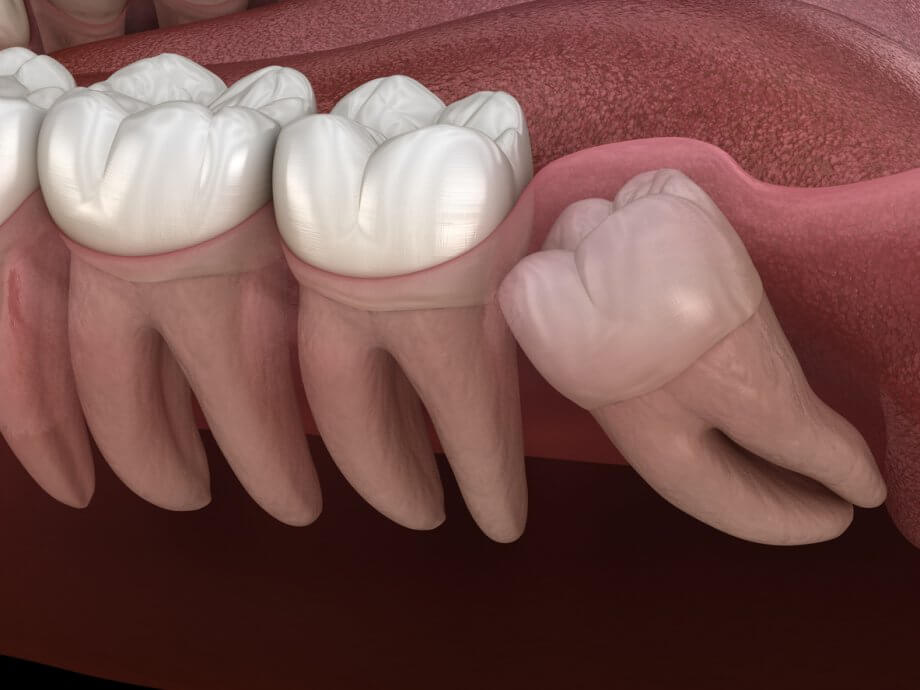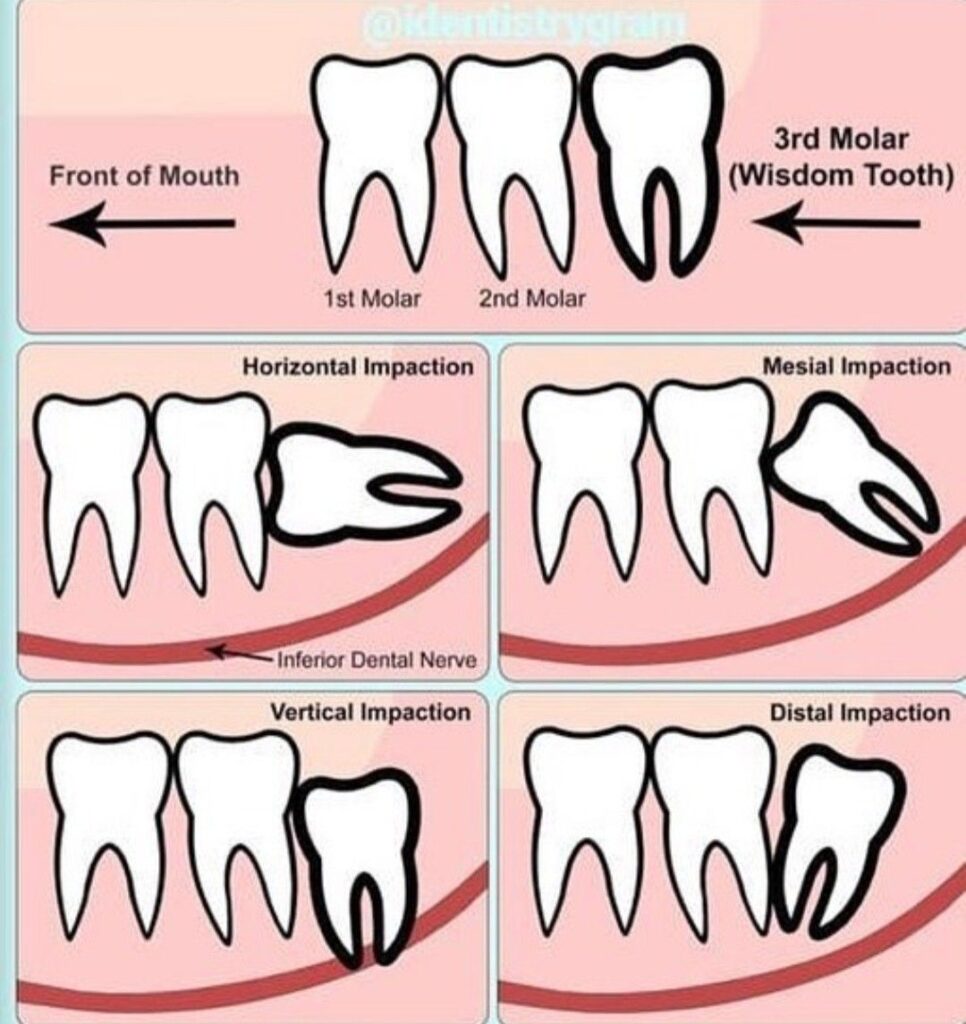
Wisdom teeth, also known as the third molars, are the last set of teeth to grow in your mouth. However, having wisdom teeth can be an incredibly uncomfortable experience if there are no space for them to grow in your mouth.
While some people have no problems with their wisdom teeth, most people would experience swelling and pain in the gum as the the teeth become stuck or “impacted”. In these cases, many would opt to have their wisdom teeth removed to eliminate the pain once and for all. In fact, the American Association of Oral and Maxillofacial Surgeons estimates that 85 percent of people will need to have their wisdom teeth removed at some point in time.
If you’re wondering whether you need to have your wisdom teeth removed, you’re not alone. This is a common question that many people ask their dentist even if they are not experiencing any pain. Often, people choose to have their wisdom teeth removed as a preventive measure.
Fortunately, we have crafted a quiz (at the last section of the article!) to help you determine whether you should have your wisdom teeth removed. By the end of this quiz, you’ll have a better understanding of whether or not wisdom teeth removal is right for you. So, grab a pen and paper, and let’s get started!
Types of Wisdom Teeth Impaction
Wisdom teeth impaction is a common problem that occurs in modern human as there are not enough room for the teeth to grow and emerge from the gum properly. When impaction happens, the teeth are stuck under the gums or partially erupted through the gum line. The teeth can also grow at an angle and press against the adjacent teeth or jawbone.
In general, there are four types of impaction, depending depending on the angle and direction in which the wisdom tooth is growing:
- Mesial impaction: the wisdom tooth is angled toward the front of the mouth and may push against the second molar.
- Vertical impaction: the wisdom tooth is growing straight up but does not have enough room to emerge through the gumline.
- Distal impaction: the wisdom tooth is angled toward the back of the mouth and may be pressing against the jawbone.
- Horizontal impaction: the wisdom tooth is growing sideways and may be pushing against the neighboring tooth roots.

Symptoms of wisdom teeth impaction can include pain, swelling, redness, and damage to the surrounding teeth. If left untreated, the impacted wisdom teeth can lead to more serious problems, such as gum disease, tooth decay, and even cysts in the jaw.
As such, it is important that you consult a dentist or oral surgeon immediately for an evaluation. In most cases, an X-ray examination is taken to determine the type and extent of the impaction. Most dentist would recommend a surgical removal of the wisdom teeth to prevent any further complications.
Wisdom Teeth Removal Quiz
Take our wisdom teeth removal quiz to assess your individual situation and determine whether or not having them removed is the best choice for you.
Answer each of the 10 questions truthfully and note down the score (in bracket) for each option you have chosen. At the end of the quiz, calculate your total score and check if the removal of your wisdom teeth is necessary.
- Are you experiencing pain around your wisdom teeth?
- A. Yes, I’m experiencing intense pain. (2)
- B. Yes, I’m experiencing mild pain. (1)
- C. No, I’m not experiencing any pain (0)
- Are you experiencing any inflammation in the gum around your wisdom teeth?
- A. Yes, I’m experiencing significant swelling along the gumline around the wisdom teeth. (2)
- B. Yes, I’m experiencing some swelling along the gumline around the wisdom teeth (1)
- C. No, I’m not experiencing any swelling along the gumline around the wisdom teeth. (0)
- Are you experiencing bleeding gums at the back of your mouth?
- A. Yes, I’m experiencing bleeding in the mouth at least once a week. (2)
- B. Yes, I’m experiencing occasional bleeding at least once a month. (1)
- C. No, I’m not experiencing any bleeding gums. (0)
- Are you experiencing the formation of cyst (fluid-filled sacs) around your wisdom teeth?
- A. Yes, I’m experiencing the formation of cysts in my mouth. (2)
- C. No, I’m not experiencing any formation of cysts in my mouth. (0)
- Are you experiencing any earaches and headaches?
- A. Yes, I’m experiencing an intense earache and headaches frequently (2)
- B. Yes, I’m experiencing occasional earache and headaches (1)
- C. No, I’m not experiencing any earaches and headaches (0)
- Do you feel any stiffness in your jaw?
- A. Yes, the jaw is still all the time (2)
- B. Yes, the jaw feel stiff occasionally. (1)
- C. No, the jaw does not feel stiff at all. (0)
- Do you feel pain or difficulty swallowing?
- Yes, I often feel pain or difficulty swallowing. (2)
- Yes, I occasionally feel pain or difficulty swallowing. (1)
- No, I do not feel any pain or difficulty swallowing. (0)
- Are you experiencing any bad breath in your mouth despite efforts to prevent or eliminate it?
- A. Yes, I’m experiencing bad breath in my mouth frequently. (2)
- B, Yes, I’m experiencing bad breath in my mouth occasionally. (1)
- C. No, I’m not experiencing any bad breath in my mouth. (0)
- Are you experiencing any unpleasant taste in your mouth?
- A. Yes, I’m experiencing an unpleasant taste in my mouth frequently. (2)
- B, Yes, I’m experiencing an unpleasant taste in my mouth occasionally. (1)
- C. No, I’m not experiencing an unpleasant taste in my mouth. (0)
- See or touch the back of your mouth where the molars are. Can you see or feel your wisdom teeth poking out through your gum?
- A. Yes, I can see or feel the wisdom teeth poking out diagonally at an angle. (2)
- B. Yes, I can see or feel the wisdom teeth poking out vertically. (1)
- C. No, I cannot see or feel the wisdom teeth poking out. (0)
Check the current status of your wisdom teeth based on your total score:
- Score 1 to 5: You are at a low risk of developing an impacted wisdom teeth. Take this quiz again after 6 months.
- Score 6 to 10: You are at risk of developing an impacted wisdom teeth. Consult your dentist or oral surgeon during your next visit.
- Score 11 to 20: You are suffering from impacted wisdom teeth. Seek advice immediately from your dentist or oral surgeon.
It is important to note that this quiz is not a substitute for professional dental advice. If you suspect that your wisdom teeth may be causing oral health problems, see a dentist or oral surgeon for a professional evaluation. They can perform a thorough exam and take X-rays to determine the extent of the problem and recommend the appropriate treatment.






